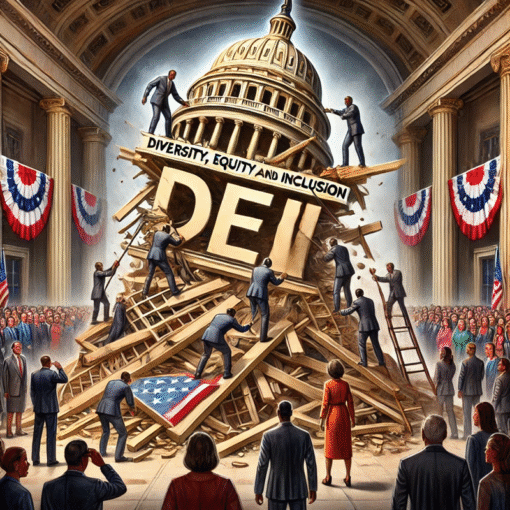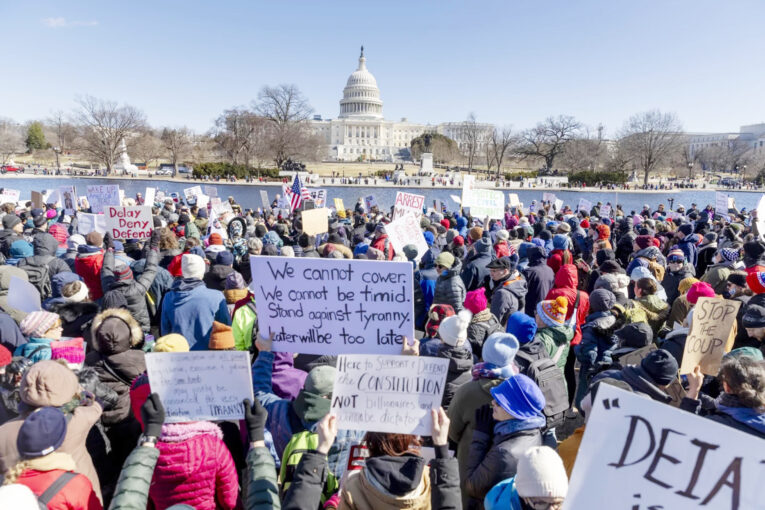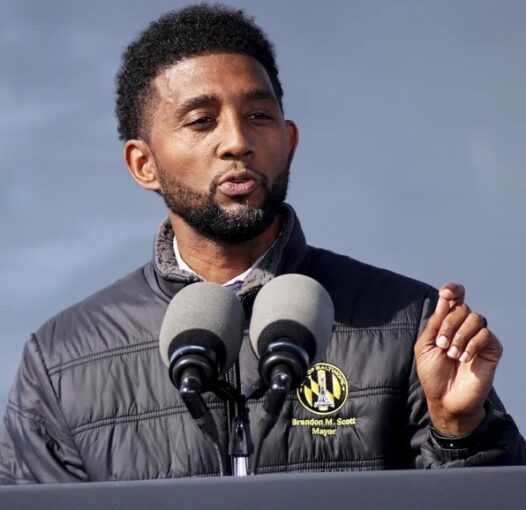Fighting back the attack on Diversity, Equity, and Inclusion
By Nadira Jamerson

“We’ve been the bogeyman for them since the first day they brought us to this country. We know what they want to say. But they don’t have the courage to say the N-word.”
—Brandon Scott, Mayor of Baltimore, Maryland.
Take a quick scroll through social media or read any number of recent news articles, and you’ll probably be bombarded with headlines and commentary about DEI. Why all the fuss? Experts say DEI has wide-reaching implications—and it’s under attack.
The acronym—short for diversity, equity, and inclusion—describes frameworks that aim to “address and correct discriminatory policies or practices that may be found within an organization,” ABC News quotes. The effect is meant to benefit those traditionally kept out of opportunities for economic, social, and educational advancement, including women, minorities, members of the LGBTQ+ community, and disabled folks. But since President Donald Trump has resumed control of the White House, the meaning of DEI has been co-opted by some far-right politicians and leaders as being harmful instead of helpful.

“We will not tolerate so-called equity policies that punish Americans based on race or gender,” Trump said about DEI initiatives during a campaign stop in September 2024. Since taking office this year, several of his executive orders and speeches have focused on eliminating DEI nationwide.
Anti-DEI rhetoric impacts every corner of American life
The pushback against DEI is impacting industries from business to climate justice and education, and minority communities are feeling the strain.
Companies including Target, Google, Walmart, Instagram, and Amazon—all of which promised to increase their racial equity practices following George Floyd’s murder and the subsequent 2020 protests—have either scaled back or totally undone their DEI initiatives, according to several reports. AP News shared that, in February, the U.S. Department of Education’s Office for Civil Rights (OCR) sent out a letter threatening to withhold funding from any K-12 public schools that did not end their DEI programs within two weeks. Just days into his second term, Trump also placed federal employees involved in DEI initiatives on paid leave, and many have now been bought out or terminated. Even programs that people would not consider falling under the DEI umbrella, including teaching army recruits about the historic contributions of Black Tuskegee Airmen and grants like the Green Fund created to reverse climate-change-related harms in minority communities, are under fire.
Mayor Brandon Scott—currently serving the city of Baltimore, Maryland—argued that the assault against DEI is really an anti-Black plot bent on removing anything having to do with Black life, history, and culture from American society.
“We’ve been the bogeyman for them since the first day they brought us to this country,” Scott said on MSBNC’s The Reid Out. His response comes after Trump used a White House press op to blame DEI hires for the tragic Washington, D.C., plane crash that took 67 lives in January. Scott adds, “We know what they want to say. But they don’t have the courage to say the N-word.”
How communities are fighting back
Though President Trump, his administration, and his supporters hold tremendous power to influence policy and rhetoric in the United States, many community leaders and activists are refusing to let DEI and the progress they believe it has created be erased without a fight.

Recently, Black folks have been banning together to participate in Blackout Days—specified days where they abstain from purchasing certain goods and services to highlight their political and economic power and withhold support from anti-DEI businesses. During one Blackout Day in February, Black people nationwide refused to shop at most stores, buy gas, and even use social media, instead funneling their dollars into Black-owned businesses. They also used their time away from screens to rest, host community events, and spend time with loved ones. Rev. Dorothy Boulware, a religion and social justice reporter at Word In Black, spotlighted similar boycotts happening during Lent. She reports that several Black churches are encouraging their congregations to take a 40-day “Target fast” during Lent, a holy season of prayer, fasting, and service. And since Target boycotts began, the corporation has lost about $12.4 billion in market value, according to Post News Group.
For activist and entrepreneur Marie Roker-Jones, resisting anti-DEI plans looks like educating her community on how to continue fair and full inclusion in their businesses with her Pivot to Progress guide and workshops.
“Equity isn’t controversial. The real controversy is when we let broken systems stay broken,” Roker-Jones wrote on LinkedIn, where she hosts the virtual events. “When people resist equity work, it’s not because it isn’t needed. It’s because it holds up a mirror, and mirrors are uncomfortable.”
In the art world, stars including Issa Rae, Ben Folds, and Shonda Rhimes are also showing solidarity with those working to keep DEI. In February, they stepped down from their roles at the John F. Kennedy Center for the Performing Arts in Washington after Trump was announced as the new board chair.
“Unfortunately, due to what I believe to be an infringement on the values of an institution that has faithfully celebrated artists of all backgrounds through all mediums, I’ve decided to cancel my appearance at this venue,” Rae wrote on Instagram.

From funding scholarship opportunities for first-generation students to attend college to helping women break into male-dominated fields and ensuring that LGBTQ+ folks and those with disabilities feel safe and supported in the workplace, DEI experts say DEI initiatives have benefited countless Americans from various backgrounds. And across many organizations, increased diversity has led to increased revenue and employee retention and satisfaction, boosting local and global economies, according to data from Wellright, an employee wellness program.
So, instead of viewing DEI as a divisive tool, those walking DEI forward know that honoring our neighbors, peers, coworkers, and employees’ differences, and creating environments where these differences can thrive, benefits more than the individual—it benefits the collective.
As renowned writer and thought-leader Audre Lorde once said, “It is not our differences that divide us. It is our inability to recognize, accept, and celebrate those differences.”
Before becoming a leader in the anti-DEI movement, even Trump highlighted how diversity makes businesses stronger in his 2006 book “Trump 101: The Way To Success.”
“Such diversity can bring new, stimulating, and creative ideas to the business,” he wrote.
Wondering how you can help keep DEI alive? Those involved in the fight recommend staying informed about and participating in upcoming boycotts, and spreading the truth about how diversity, equity, and inclusion create a brighter future for everyone.

